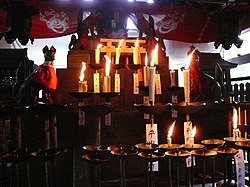Ethnic religion

Altar to Inari Ōkami at the Fushimi Inari Shrine in Kyoto. Shinto is the ethnic religion of the Japanese people.
In religious studies, an ethnic religion (or indigenous religion) is a religion associated with a particular ethnic group. Ethnic religions are often distinguished from universal religions which claim to not be limited in ethnic or national scope, such as Christianity or Islam or Buddhism or Jainism.[1] Ethnic religions are not only independent religions. Some localised denominations of global religions are practised solely by certain ethnic groups. For example, the Assyrians have a unique denominational structure of Christianity known as the Assyrian Church of the East.
Contents
1 Terminology
2 Usage
3 See also
4 References
Terminology
A number of alternative terms have been used instead of "ethnic" or "indigenous" religions.
The term "primal religion" was coined by Andrew Walls in the University of Aberdeen in the 1970s to provide a focus on non-Western forms of religion as found in Africa, Asia, and Oceania.[2] Terms such as "primal religion," "primitive religion," and "tribal religion" have been contested by Walls' student, Jim Cox, who argues that such terms suggest an undeveloped religion which can be seen as a preparation for conversion to Christianity. Cox prefers to use the term "indigenous religion."[3]
Another term that is often used is "folk religion." While "ethnic religion" and "folk religion" have overlapping uses, the latter term implies "the appropriation of religious beliefs and practices at a popular level."[4] The term "folk religion" can therefore be used to speak of Chinese and African indigenous religions, but can also refer to popular expressions of more multi-national and institutionalized religions such as Folk Christianity or Folk Islam.
Usage
Ethnic religions are distinctive in their relationship with a particular ethnic group and often in the shaping of one's solidarity with an ethnic identity.[5] Some ethnic religions include Hinduism of the Indians, Judaism of the Jews, Chinese folk religion of the Han Chinese, Shinto of the Japanese, and A ƭat Roog of the Serer of Senegal, The Gambia, and Mauritania.[6]Diasporic groups often maintain ethnic religions as a means of maintaining a distinct ethnic identity, such as Hinduism among diasporic Indians in the Caribbean, the United States, Canada, Australia, New Zealand, United Kingdom, France, Netherlands, southern and eastern Africa, Mauritius, Fiji, and the Malay Peninsula,[7] or the role of African traditional religion and Afro-American religions among the African diaspora in the Americas.[8]
Some ancient ethnic religions, such as those historically found in pre-modern Europe, have found new vitality in neopaganism.[9] Moreover, non-ethnic religions such as Christianity have been known to assume ethnic traits to an extent that they serve a role as an important ethnic identity marker,[10] a notable example of this is the Serbian "Saint-Savianism" of the Serbian Orthodox Church.[11]
See also
- Animism
- Ancestor worship
- Endogamy
- Gavari
- List of ethnic religions
- List of Neopagan movements
- National god
- Shamanism
- Slava
- Totemism
References
^ Hinnells, John R. (2005). The Routledge companion to the study of religion. Routledge. pp. 439–440. ISBN 0-415-33311-3. Retrieved 2009-09-17..mw-parser-output cite.citation{font-style:inherit}.mw-parser-output q{quotes:"""""""'""'"}.mw-parser-output code.cs1-code{color:inherit;background:inherit;border:inherit;padding:inherit}.mw-parser-output .cs1-lock-free a{background:url("//upload.wikimedia.org/wikipedia/commons/thumb/6/65/Lock-green.svg/9px-Lock-green.svg.png")no-repeat;background-position:right .1em center}.mw-parser-output .cs1-lock-limited a,.mw-parser-output .cs1-lock-registration a{background:url("//upload.wikimedia.org/wikipedia/commons/thumb/d/d6/Lock-gray-alt-2.svg/9px-Lock-gray-alt-2.svg.png")no-repeat;background-position:right .1em center}.mw-parser-output .cs1-lock-subscription a{background:url("//upload.wikimedia.org/wikipedia/commons/thumb/a/aa/Lock-red-alt-2.svg/9px-Lock-red-alt-2.svg.png")no-repeat;background-position:right .1em center}.mw-parser-output .cs1-subscription,.mw-parser-output .cs1-registration{color:#555}.mw-parser-output .cs1-subscription span,.mw-parser-output .cs1-registration span{border-bottom:1px dotted;cursor:help}.mw-parser-output .cs1-hidden-error{display:none;font-size:100%}.mw-parser-output .cs1-visible-error{font-size:100%}.mw-parser-output .cs1-subscription,.mw-parser-output .cs1-registration,.mw-parser-output .cs1-format{font-size:95%}.mw-parser-output .cs1-kern-left,.mw-parser-output .cs1-kern-wl-left{padding-left:0.2em}.mw-parser-output .cs1-kern-right,.mw-parser-output .cs1-kern-wl-right{padding-right:0.2em}
^ Cox, James L.; Sutcliffe, Steven J. (1 March 2006). "Religious studies in Scotland: A persistent tension with divinity". Religion. 36 (1): 1–28. doi:10.1016/j.religion.2005.12.001.
^ Cox, James L. (2007). From Primitive to Indigenous: The Academic Study of Indigenous Religions. Aldershot: Ashgate. pp. 9–31. ISBN 978-0-754-65569-5.
^ Bowker, John (2000). "Folk Religion". The Concise Oxford Dictionary of World Religions. New York: Oxford University Press. ISBN 978-0-191-72722-1.
^ Ruane, Joseph B.; Todd, Jennifer, eds. (2011). Ethnicity and Religion: Intersections and Comparisons. London: Routledge. ISBN 978-1-138-88037-5.
^ Westermann, Diedrich; Smith, Edwin William; Forde, Cyril Daryll; International African Institute; International Institute of African Languages and Cultures; Project Muse; JSTOR (Organization), Africa: journal of the International African Institute, Volume 63, pp 86-96, 270-1, Edinburgh University Press for the International African Institute (1993)
^ van der Veer, Peter; Steven Vertovec (April 1991). "Brahmanism Abroad: On Caribbean Hinduism as an Ethnic Religion". Ethnology. 30 (2): 149–166. doi:10.2307/3773407. JSTOR 3773407.
^ Oduah, Chika (19 October 2011). "Are blacks abandoning Christianity for African faiths?". theGrio. Retrieved 27 May 2016.
^ Lewis, James R. (2004). The Oxford Handbook of New Religious Movements. New York: Oxford University Press. ISBN 978-0-195-36964-9.
^ Chong, Kelly H. (1997). "What It Means to Be Christian: The Role of Religion in the Construction of Ethnic Identity and Boundary Among Second- Generation Korean Americans". Sociology of Religion. 59 (3): 259–286. doi:10.2307/3711911. JSTOR 3711911.
^ https://books.google.com/books?id=UxDRgBAOKLAC&pg=PA158&dq=serbian+nationalism+st+sava&hl=en&sa=X&ved=0ahUKEwjrjovEvM7TAhUJ2mMKHeixDgIQ6AEILDAB#v=onepage&q=serbian%20nationalism%20st%20sava&f=false